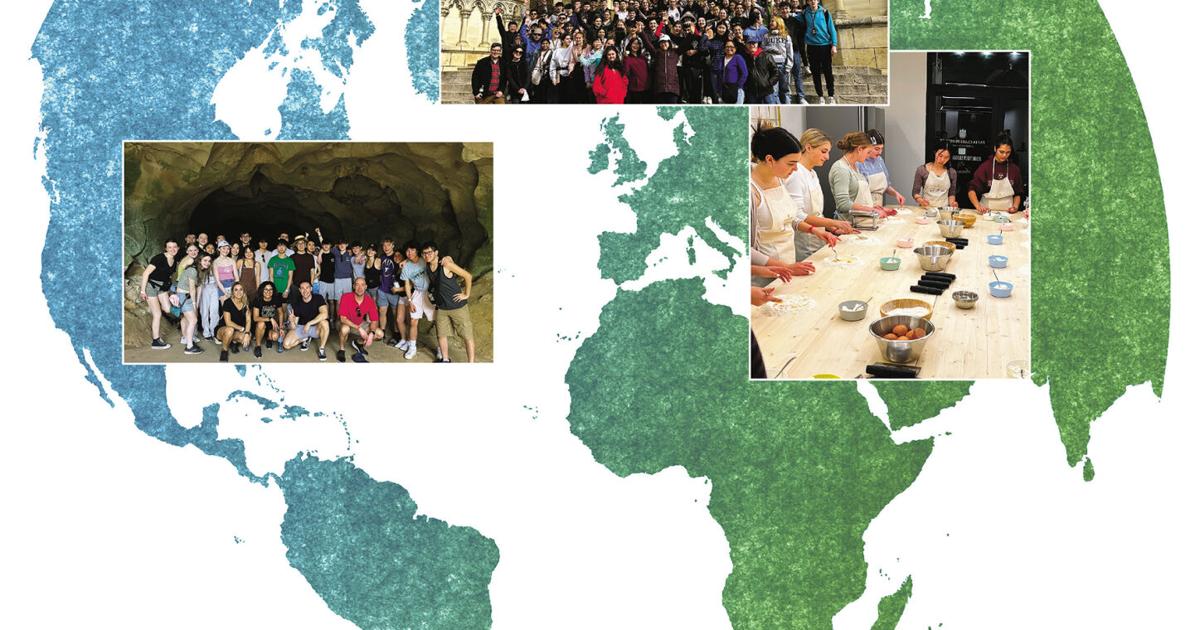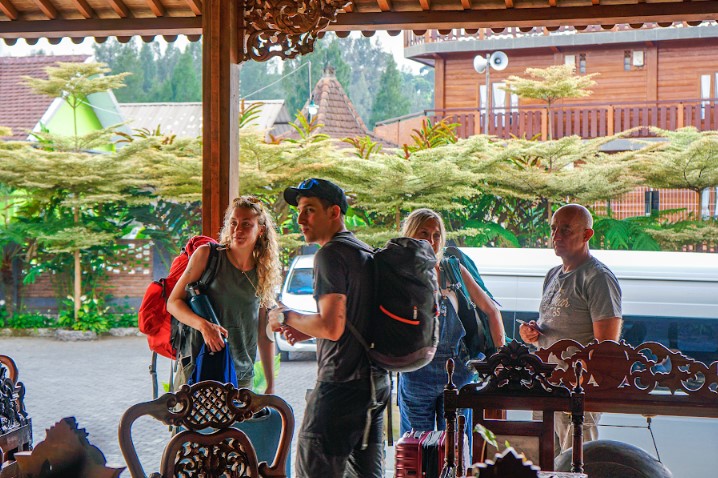International travel has been a staple of February break for Scarsdale students for decades. After a three-year hiatus from travel abroad during the COVID-19 pandemic in 2020, 2021 and 2022, the final barrier of that era was broken when four groups represented Scarsdale High School throughout the world last week — the band and choir headed to Spain, the orchestra to Italy and Switzerland, and exchange students to Italy. In addition, a group of Spanish students from Edgemont toured the Dominican Republic, the school’s first international travel since 2016.
With all conductors, teachers, chaperones and students returning safely home, it was as perfect a return to overseas travel as could have been imagined as with three years of canceled trips, none of the students — even the seniors who were freshmen in the winter of 2019-20 — had been abroad as a touring school group.
Orchestra director Amédée Williams has a long history of taking his students overseas for concerts and cultural experiences in places like Argentina, Germany, Southern Italy, Ireland, Italy/Switzerland, Cuba and Salzburg/Hungary in February 2019, the last trip pre-pandemic.
For February 2020, Williams was set to lead the road portion of an exchange to China, but that was canceled as COVID-19 was already widespread in its point of origin. 2021 was supposed to be an orchestra trip to Russia, but that destination likely won’t happen for quite some time with the invasion of Ukraine still a global crisis.

Scarsdale’s orchestra performed in Italy and Switzerland.
Williams called last week’s trip to Italy and Switzerland, a repeat of a tour from 2015, “one of the better tours we’ve had.”
“None of them had been on the tour before and that was a big difference, because usually I have a group of upperclassmen that know the ropes and understand what this is about. I didn’t have that advantage this time,” Williams said. “But I took a great group of kids. They were so punctual and listened and they were fantastic. A lot of the students are pretty well traveled anyway. It felt like we hadn’t skipped a beat.”
Fifty-five of his 140 orchestra students went on the journey, which included three performances and a host of cultural activities in Cremona, Busseto and Milan, Italy, and Lucerne, Root and Mount Titlis, Switzerland. The orchestra also had master classes and opportunities to visit elite violin-makers, experience local dining and participate in various sightseeing adventures.
Between the tour company promoting Scarsdale’s concerts well, two of them including a joint concert and exchange with other student ensembles, and the desire for the locals to experience live music at historic venues, the shows at Manenti Auditorium Hall (former San Bernadino Church) in Crema, Teatro Giuseppe Verdi in Busseto and Der Maihof in Lucerne were packed if not sold out.
“Usually they’re playing in front of Mom and Dad or their brothers and sisters [in Scarsdale]. To look out and not know anyone in the audience really is a completely different experience,” Williams said. “I think they were really excited and they definitely rose to the occasion.”
Senior Erika Wu appreciated the challenge. “Playing in beautiful venues in front of large crowds in a new country was definitely intimidating, but it was also a chance that I would have never had otherwise,” she said. “It was scary thinking about how our orchestra may act as a reflection of our community to those in Italy and Switzerland, and I believe the pressure made many people anxious. The pressure was also exhilarating though, and I am incredibly grateful to have been able to perform in these places.”
After performances with the Orchestra Giovanile di Cremona Mousike in Cremona and Capella Con Fuoco in Lucerne, the Scarsdale students got to interact with their counterparts.
“One of my favorite parts of the trip was being able to play with the Italian and Swiss orchestras, and getting to befriend people in those orchestras,” Wu said. “When I asked a girl in the Italian orchestra what she likes to do for fun, she told me [they] like to go out to nightclubs — not exactly a typical response if one were to ask someone in Scarsdale. It was also interesting to see how their orchestra was not part of their school curriculum, but instead was separate for those who wished to pursue orchestra in their own time.
“In Switzerland, we had the chance to get to know some people in the orchestra over dinner, and one of the girls I spoke to was telling me about how at the end of this pre-college program, she would have to play in front of a jury who would determine if she would be able to graduate. It was interesting to learn about how important music was in these countries, and how important it was to these students as well.”

The orchestra spent plenty of time touring and exploring in Italy and Switzerland.
In addition, one of the major benefits of the trip was for the members of the orchestra to get to know each other. On the trip to Italy, Williams allowed the students, once the seatbelt light went off, to switch seats to sit with friends. On the way home, no one opted to move.
“I think it’s because they’re all friends now,” Williams said. “You’d be surprised the students don’t really know each other, especially over different grade levels. It’s amazing how much they bonded, especially on this trip. They really know each other well now and that’s just a huge benefit to playing with each other when they come back.”
A new, exciting experience
Though they both are in their 17th year teaching, choir director Amanda Gundling and wind ensemble director Brian Zeller are first-year teachers at Scarsdale High School. Neither had ever traveled internationally with student groups before, so for them it was trial by fire as they began preparing over the summer for their joint trip to Spain prior to even meeting any of their students.
With 22 choir students and 57 band students, Gundling and Zeller had an adventure they will never forget and they’re already excited about touring together again next winter.
“This has been a seven-month preparation process,” Gundling said. “Every detail has to be outlined and organized. We ran into a few bumps on the road there, and thank God we were so organized. We troubleshot everything quickly and with precision. And almost all of these kids understood the level of discipline needed for this trip because it’s not a camp tour, they’re not just sightseeing.”

Scarsdale’s choir performs in Spain.
The groups both used their winter concert repertoire they’d been working on since the start of the school year for their concerts in Spain. Gundling took 16 of her 24 advanced choir students and six of her 19 freshman choir students, so the freshmen got to spend time working with the older students and learning their music on Wednesday mornings before the bell rang for school. Knowing there would be plenty of other “stressors” on the trip, Gundling wanted the music to be “instinctual.”
The first performance took place at Auditori Salvador Segui in Valencia with local ensemble Bada de Musica del Centre Instructiu; the second at Palacio de Congresos de Toledo in Toledo; the final one at Auditorio Municipal Joaquin Rodrigo with Joven Camarata.
“They’re not only touring regularly, but they’re performing at a really high level,” Gundling said. “There were articles written about them, there’s a documentary being made at the last Madrid performance.”
The feedback they received from audiences in earning applause and learning to soak it in before starting their next piece were uplifting for the choir and band.
“At most we had about 20 Scarsdale people in an audience of hundreds and hundreds and hundreds, so you’re really playing for strangers and that’s a nice glimpse into the professional world for the students,” Zeller said. “You can’t count on the fact that Grandma and Grandpa are going to clap for you, no matter what, to carry you through. You have to step up the level and bring an experience that is worthy of having for the audience.”
“We got an email from a couple after our Valencia concert,” Gundling said. “They’re ex-pats from Texas and one of them was part of the most well-known gay men’s choirs in Texas for 30 years and his husband got him tickets to our concert. He wrote this beautiful email and said he always wondered who was coming to these concerts when he toured and now he’s one of them. I think the kids really took that to heart.”
Though they experienced several cities, the group stayed in Valencia and Madrid.
“A lot of them understood everything because they take Spanish or AP Spanish,” Gundling said. “I’d say at the beginning many of them understood everything, but were scared to talk. By the end they were speaking and we were putting kids on the spot to open up the concerts. I think they got a lot out of the language side.
“A lot of these kids are very well cultured. They travel all over and they also understand etiquette, the things you teach your own children like [saying] please and thank you. Everywhere they went they were always polite.”

The wind ensemble and choir programs toured Spain.
The group had master classes, a boat tour, beach time, an arts district tour, a cave visit, museums, chapels and fortresses.
“You could see on their faces that it was a lot,” Zeller said. “It was a really jam-packed schedule with a lot of experiences, a lot of performances. You could see they were tired, but they were still absorbing and taking it all in, asking intelligent questions at the museums and to the tour guides. They were very impressive.”
There was free time to roam local areas, shop and dine, giving the students some freedom throughout the trip.
“Both of us were nervous when we gave them free time and it was probably the best,” Gundling said. “On our next tour we’ll probably do more of that. They got to explore the cities in small groups on their own and they never missed a deadline, never gave us cause to tell them they can’t do this. For them that was probably their favorite.”
The trip was ultimately centered around building life skills.
“This is a great experience for them musically and culturally aside,” Zeller said. “It’s a great experience for them to grow up and have an adult experience where Mom and Dad aren’t there. You have to hold your passport and your money and set your alarm. It’s great for them to be able to experience the world still in a safe and structured environment, but without some of the crutches they would otherwise have.”

Scarsdale’s wind ensemble performs in Spain.
Senior choir student Steven Su had been waiting for this trip his entire high school career. “It was fun and it was the first time I was ever away from my parents for such a long amount of time, so it was good to have that independence,” Su said. “It was exciting because our days were super packed and we were performing in front of a lot of people. I think the people in the chorus really loved performing. That was fun.”
He is a Spanish student and appreciated the opportunity to put his language skills to use. “The Spanish they teach us in school is way different — they use Castilian in Spain — but it was fun,” Su said. “Things were different, but not that different.”
Junior Anjali Schoetz said the most nerve-wracking part of the trip was singing “Yo Le Canto” to a native Spanish audience. “They actually loved that one, which was pretty cool,” she said. “I will say the audiences in Spain are so much more engaged than they are here. The first day they were screaming, ‘Arriba,’ and, ‘Vámanos.’ We had an encore on the third day, so that was pretty cool.”
Walking around and soaking in her surroundings with her friends was a highlight for Schoetz. She found the local vibe to be more chill than New York City, where she enjoys going to museums.
“I do love art and going to the Met with my mom, and the MOMA, so I had seen that,” she said, adding that while traveling, “you learn so much more. I love Salvador Dali’s paintings. I hadn’t seen those before going to Spain.”
Junior Christina Semple was disappointed that COVID took away her freshman and sophomore year opportunities to travel with choir and until last week she was afraid it might never happen.
“It was kind of what I expected, just to a greater extent,” she said. “I definitely knew we were going to be busy, and I was expecting all the tours we had and all the activities. I expected a little more structure than we had sometimes. I was very surprised the free time we were allowed to have because we’re just high school kids and we were just walking around. It was fun and I was thankful for that.”
The architecture at the performance venues really stood out for Semple.
“To be in such a new space when we’ve really only been in our auditorium as a group was really cool,” she said. “And having so many people we didn’t necessarily know there who just wanted to see music was cool. The band was so fun to perform with. I’d never really gotten to see the band — I have a running joke with everyone now [about] how I’m so impressed with the band … they’ve always been right in front of me and I never knew it. It was a very good eye-opener.”
Seeing the two groups interact was also a highlight for the conductors.
“The choir kids live up in the [SHS] tower and the band kids are down there, the orchestra over there,” Gundling said, pointing out locations in the high school. “The choir and band kids all intermingled so nicely and one of their favorite things was to meet each other. I think they would want to go as two ensembles again.”
Added Zeller, “Even though we all go to the same school, there’s a lot of faces here.”
Exchange completed
When exchange students from Italy came to Scarsdale in September, that was a major step forward, and the Scarsdale students finally got to complete the exchange last week (https://bit.ly/3ERACHb).
Global opportunities coordinator Heather Waters called the trip “transformative for the kids, everything we hoped for them and the experience.” It was a far cry from all of the virtual experiences she’d been hosting over the last three years.
“They immersed themselves in the experience of both the exchange and the travel piece, embracing the rich possibilities,” Waters said. “The history and art they have studied in ninth and 10th grades came alive. At SHS, we support these programs as we believe there is a tremendous power of place, and we are so happy to have been able to start these immersive experiences again.”

Italian exchange students visited many cities throughout the country.
In addition to homestays and reconnecting with their counterparts from Educandato Statale Uccellis, the Scarsdale group traveled and toured Udine, Venice, Florence, Orvieto, Pisa, Rome and Pompeii.
“While in Udine they attended classes and shared presentations on American life and learned some Italian, too,” Waters said. “We also had a private audience with the mayor of Udine and another with the head of the university. They visited Italy from north to south and climbed the Tower of Pisa and Mount Vesuvius.”
Junior Annika Fuehrer, despite a busy schedule with school and volleyball, enjoyed hosting a student and giving her a taste of life in Scarsdale last fall. She was nervous heading to Italy out of her comfort zone, but once she arrived at Educandato Statale Uccellis she was at ease.
“The Italians were all so nice and welcoming, it felt as if we were back in Scarsdale,” Fuehrer said. “I had the time of my life the first week staying with Sofia. Nicole had moved, so a new girl hosted me. It was so eye-opening to go through their daily lives with them, from school to the city center after school to a day trip to Venice. They took such great care of us. We were so sad to leave.”

The exchange students got to see major sites throughout Italy.
The “indulgence” was the “biggest culture shock” for Fuehrer.
“I found that in Italy, the food portions are small, whether it’s the croissants or espresso we had for breakfast or the gnocchi we had for lunch,” she said. “Coming back to America, I realized that we surround ourselves with food and eat whenever possible. Going to Italy with an [American] appetite was definitely hard, but I got used to it. Along the same lines, I realized how much more ordered and sophisticated their school was. For example, we had chefs cook us lunch every day at their canteen, with tablecloths, bread, water glasses and pitchers.”
Leaving Scarsdale, whether one goes to Pennsylvania or to Italy, is important for any student to “leave our Scarsdale bubble,” according to Fuehrer.
“Seeing the world through different cultures and perspectives is what helps reinforce diversity into the world, which I value a lot,” Fuehrer said. “Most people live their lives in a similar way, but the details of how things are done are quite different. There is no right way or wrong way, there are just different ways. Removing judgment is an important lesson to learn, and cultural exchanges help us become more comfortable with an open mind.”

Italian exchange students visited sites old and new.
Post-COVID, the ability to travel means so much more.
“During the pandemic, we were locked up inside of our houses, constantly surrounded by the same people and environment, which can really mess with some people’s heads,” Fuehrer said. “Having the school offer a trip to get away from our day-to-day environment is something everyone should be grateful for, not only because the opportunity exists, but for the fact that our school wants what’s best for us. I think that having access to trips like these is extremely important for mental health and for overall happiness for students.”
Edgemont back on the road
Edgemont High School Spanish teacher Jedd Chesterson gets the award for best documentation of a trip through his blog (https://sites.google.com/view/edgemontindr/). Chesterson had taken students to Spain in 2014 and 2016, but this trip to the Dominican Republic was personal, as he had lived there and part of the itinerary including connecting with students at Colegio Padre Emiliano Tardif and Canae Restaurant in his old neighborhood.
“For me, especially having had the experience abroad, even if a student doesn’t take away an immediate improvement in their language skills, it sparks a different type of interest in language and culture that they otherwise may not have seen if they didn’t travel internationally,” he said.
Chesterson and fellow teacher Chris Thoren have had students come back and say they ended up studying abroad in Spain thanks to the experiences they provided when they were in high school.
“This year I wanted to give the students a different perspective on the world, so instead of going to Spain, which is kind of the default Spanish trip, … I wanted them to see [a] part of the world that has a little different history, like the colonized history,” Chesterson said. “It’s also a chance for them to get in touch with a culture that’s right in front of them here in New York.”
This year’s trip included 20 juniors and seniors and four chaperones staying in Santo Domingo, Santiago and Puerto Playa, in addition to seeing all the different parts of the D.R., some touristy, some not, including the New York Yankees Baseball Academy, the Cuevas de Pomier and Damajagua.

Edgemont Spanish students traveled to the Dominican Republic.
The day at Colegio Padre Emiliano Tardif was the most memorable for Chesterson. He called it the “most amazing” of his 16-year teaching career. He had been planning the visit since September and visited in November to hash out the details. “They took it and ran with it and when we got there they had a whole day of events for us,” Chesterson said.
Seeing the students interact was pure joy. “My face hurt from smiling so much,” Chesterson said. “And as cliché and corny as it sounds, those are the moments when as a teacher you’re looking at everything you’ve worked so hard to do, and it’s not just about language.”
Chesterson did his best to prepare his students to be “open and vulnerable to new experiences” as the Dominicans tend to be more outgoing. When they arrived at the school, the ice break activity was dancing and singing, so there was no easing into the new experience.
“Even the ones [for whom] I said it was going to be very difficult … were dancing merengue and bachata and they were singing,” Chesterson said. “It was the most amazing thing I’ve ever seen in terms of facilitating an experience for my students.”
The Dominican students had stronger English skills as compared to the Edgemont students’ Spanish skills.
“That comes from the fact that a lot of them have family in the United States, and they’re exposed to English all the time with a lot of pop culture out there in English,” Chesterson said. “For them it’s a little more practical. They’re not just relying on their English class in school. A lot of our students if they aren’t speaking Spanish in class they aren’t doing it outside of class.”
Junior Wesley Coker had been to Japan and was frustrated not being able to communicate there, so he was excited to put his Spanish skills to the test, especially at Colegio Padre Emiliano Tardif.
“That was by far my favorite part of the trip,” Coker said. “That was the point, to interact with the Dominican students. They put on a performance for us in their auditorium; it was a big spectacle and it was awesome. They did a great job hosting us.
“I was very surprised at how good their English was. Even some of the slang terms of the texting terminology that we use here they use. We have a group chat with those students now and it’s fantastic.”

The cultural and language experience will last a lifetime for Edgemont’s students.
Coker said the trip also strengthened the bond between the students and teachers. “I had some of my close friends who went, but there were also some students who I wasn’t really good friends with, and over the course of the eight days I got to know everyone really well,” he said. “Even the teachers. I feel closer with the teachers now. They did a great job planning and it was a nice experience living with kids my age for the week.”
Seeing the country from all different angles was important — it wasn’t just about the beach or the residential areas.
“I thought it was very eye-opening seeing how their society is different from ours,” Coker said. “I thought it was very cool to see all the different areas. Even in the eight days I think my Spanish has definitely improved significantly. It’s made me a lot more engaged in Spanish class because I’m very interested in the society and the language now.”
Stephanie Avolio’s mother is from the Dominican Republic, but Avolio, a junior, didn’t begin learning Spanish until seventh grade. She’s been to Spain and the D.R. on family trips, so this was a different experience for her. Avolio enjoyed the freedom that came with being on the trip.
“The previous times I went there I went with my mother and my sister, but this time I went with the juniors and seniors who are around my age, 16-18, so I got to experience the freedom of walking around the town with only your friends, trying not to get lost, figuring out currency and trying to communicate with others with the limited language skills that we all have,” she said. “And with those new friends I was able to learn more. We also talked in our rooms for hours on end and learned so much about each other that it felt like we knew each other for years even though it was only a week.”






More Stories
How to Pack for the UK Weather (Yes, Even in July!)
An Entrepreneur’s Guide To Responsible Travel
Important Updates on Passport Processing